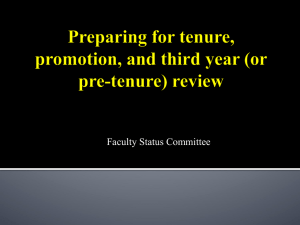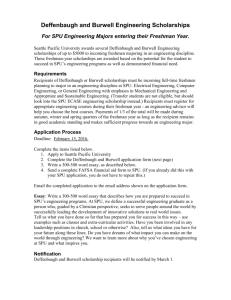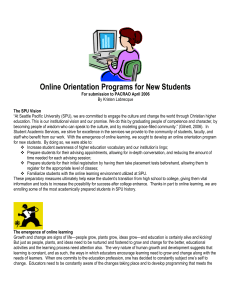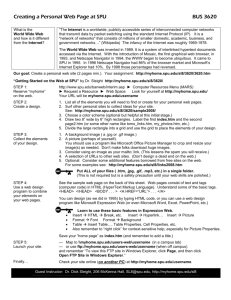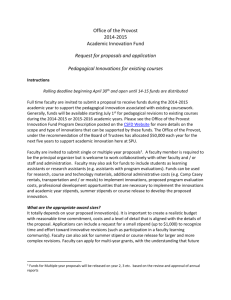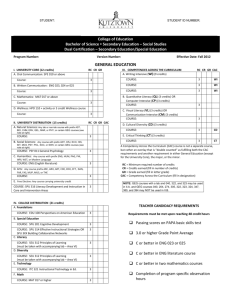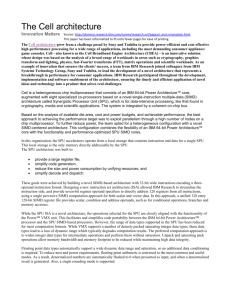COM 1101: Intro to Interpersonal Communication 1
advertisement
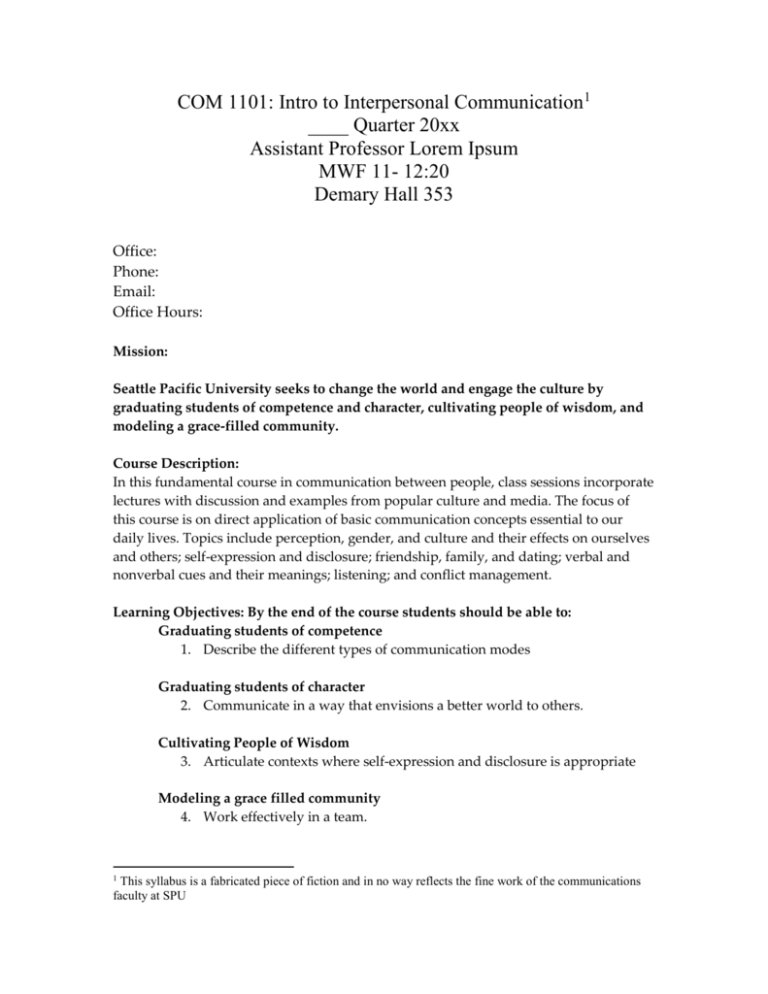
COM 1101: Intro to Interpersonal Communication1 ____ Quarter 20xx Assistant Professor Lorem Ipsum MWF 11- 12:20 Demary Hall 353 Office: Phone: Email: Office Hours: Mission: Seattle Pacific University seeks to change the world and engage the culture by graduating students of competence and character, cultivating people of wisdom, and modeling a grace-filled community. Course Description: In this fundamental course in communication between people, class sessions incorporate lectures with discussion and examples from popular culture and media. The focus of this course is on direct application of basic communication concepts essential to our daily lives. Topics include perception, gender, and culture and their effects on ourselves and others; self-expression and disclosure; friendship, family, and dating; verbal and nonverbal cues and their meanings; listening; and conflict management. Learning Objectives: By the end of the course students should be able to: Graduating students of competence 1. Describe the different types of communication modes Graduating students of character 2. Communicate in a way that envisions a better world to others. Cultivating People of Wisdom 3. Articulate contexts where self-expression and disclosure is appropriate Modeling a grace filled community 4. Work effectively in a team. 1 This syllabus is a fabricated piece of fiction and in no way reflects the fine work of the communications faculty at SPU 2 5. Demonstrate the ability to listen and engage with people whose culture is different from one’s own. Required Resources: Campolo, A., & Darling, M. A. (2010). Connecting like Jesus: Practices for healing, teaching, and preaching. San Francisco, Calif: Jossey-Bass. Trenholm, S. (2007). Thinking through communication: An Introduction to the study of human communication. 5th Edition: NY: Allyn & Bacon. Recommended Resources: Participation in Community SPU is a University that values the development of Competence as well as Character. According to Theologian Stanley Hauerwas, Character is best developed through the stories that we are able to tell in interaction with others in community. To develop Character, we cannot be mere bystanders. We must encounter each other as human beings rather than things among things that are instrumental to our own goals. To this end, I want us to use this class as the opportunity to encounter each other as human beings who have greater life roles than student and professor. I want us to be willing to talk to each other in dialogue and I want to form a sense of community among us that goes beyond sharing time and space. Part of building community is what Martin Buber called “trustful knowing.” Part of that trustful knowing for me is that you come to class prepared, having completed any required prep work, thought about the day’s issues and are ready to respect your classmates work and dialogue in community with the material. Plan on attending class, being on time, working with your group and participating with the entire class– you will indeed miss something; we will all miss something, if you do not attend class. Eat before coming to class: Eating during class time is often smelly and disruptive to me and others so do not bring in anything in to eat that has a strong aroma or is crunchy. Favorite beverages are usually just fine. Plan on spending 2 additional hours associated with class preparation / studying for each undergraduate credit. Because this is a five credit course, you should expect to devote, on average, an additional 10 hours of studying each week to successfully complete this course. You are welcome to bring your laptop and smart phone to class to use as a learning tool. However, when you switch between class and personal work (e.g. texting and Facebook) Sample Syllabus: SPU Center for Scholarship and Faculty Development Fall 2013 3 you are causing a distraction to others around you (even if you think you are being discreet). Subsequently, using your phone or computer for any other reason besides purposes directly related to class is a violation of the practice of community. Please do come by during my office hours. If you have a question is time sensitive, you can e-mail me but only if you can demonstrate that you first tried to get the answer or solve your issue on your own. 96100 90-95 87-89 84-86 80-83 Grading A 77-79 AB+ B B- 74-76 70-73 67-69 64-66 C+ 60-63 D- C CD+ D 59 & ↓ E Student Learning Assessment 1) 2) 3) 4) 5) 6) 7) Blackboard prep-work 10% Quizzes 20% There will be a 5 item T-F quiz before the beginning of each class starting April 12 based on the required prep work for the class period. The quiz will start promptly at 11am at the beginning of class. Mid-term30% On-line presentation 10% Using your favorite on-line video program, create a five-minute video convincing others that they should move to your hometown after graduation. You must speak (or voice over) at least 3 minutes of the video and use three communication modes. Be creative. If you are worried about being too creative – just ask. Group Presentation 20% Research a small group, cultural or social issue; Identify major points from three different perspectives, draw two conclusions and make three recommendations one each, for yourself, for others students and for society Team work – peer evaluation (see rubric & rating form on Black board) Participation in community 5% Completion of the student course evaluation is included in your participation. Please bring a copy of the e-mail you receive once you complete the evaluation to get full credit for class participation. Extra Credit 5% --- look at the lecture series at Town Hall, Benaroya Hall or lectures here at SPU (Feel free to check with me for appropriateness). Attend and write a two page summary noting the topic and context (why Sample Syllabus: SPU Center for Scholarship and Faculty Development Fall 2013 4 was this person giving the lecture; describe the setting). What was the communication strategy? What were the main points and what were the conclusions? Did emotion play a role? Was there a vividness and narrative to the lecture? Who do you think was the modal audience for this talk? Were there examples which you could relate to? What did you learn? Will this event change your thoughts, values or future action? Learning Objectives and Assessment Learning Objectives Describe the different types of communication modes Work effectively in a team Communicate in a way that envisions a better world to others. Articulate contexts where selfexpression and disclosure is appropriate Demonstrate the ability to listen and engage with people whose culture is different from one’s own. Black board prep work Quizzes X X Midterm Individual Presentation Group Presentation Peer Eval. Participation X X X X X X X X X X X X X Policy Notes: 1. Academic Integrity: As a University that promotes character as well as student competence, SPU expects that graduates will embody personal and professional integrity by serving the public good in doing what is right and doing so with an awareness of consequences. The current edition of the SPU Undergraduate Catalog describes the University’s commitment to academic integrity, which is breached by academic dishonesty of various kinds. Among these is turning in another’s work as your own and committing plagiarism, which is the copying of portions of another’s words from a published or electronic source without acknowledgement of that source. The penalty for a breach of academic integrity is a failing grade for the work in Sample Syllabus: SPU Center for Scholarship and Faculty Development Fall 2013 5 question on the first offense and a failing grade for the course as a whole with repeated offenses. 2. Exam policy: Exams cannot be rescheduled except in the case of mitigating circumstances which in my judgment warrant rescheduling the exam. For the final exam, if you have two or more exams scheduled on the same day as this class’s final, you and I may reschedule this exam at a mutually convenient time prior to the scheduled exam period; although I am under no obligation to reschedule and so I recommend that you also check in with your other instructors to see if they might be willing to reschedule. Additionally, as with other exams, if you have a mitigating circumstance you may request to take the final exam early if you send an e-mail to me at least two weeks before the regularly scheduled final exam period to reschedule. If I agree to reschedule your final exam, you can expect that it will occur no earlier than four working days prior to the last day of the final examination period. 3. Due dates are firm; exceptions will be made only for dire illness or emergencies, not poor planning or lots of work. 4. Grades for late work will be lowered one grade (from A to A-) for each 24-hour period, including weekends. 5. Incomplete coursework: You may request an incomplete grade if you are unable to complete all course requirements by the end of the quarter given unexpected personal need and you have already completed at least 50% of the course requirements. You must initiate this request for an incomplete grade no later than the 10th week of the quarter. I am under no obligation to grant an incomplete and I can ask for verification of the rationale behind a request (e.g. medical documentation). If I offer you an incomplete, I will also create a completion plan outlining the requirements to complete the course which may differ from the course requirements which will then need to be approved by the Department Chair. If you do not meet the completion plan by the end of finals week the following quarter, I will calculate your course grade based upon the work completed in the course and completion plan. Once this grade has been submitted it cannot be changed, except by petition as outlined in the University Catalog under Academic policies and Procedures. If the grade is not changed within a year, the University will automatically change the grade to “E.” 6. Disability statement: In accordance with Section 504 of the Rehabilitation Act of 1973 and the Americans with Disabilities Act of 1990, students with specific disabilities that qualifies for academic accommodations should contact Disabled Student Services (DSS) in the Center for Learning. DSS in turn will send a Disability Verification Letter to the course instructor indicating what accommodations have been approved. 7. Course Evaluation: Plan on completing the online evaluation of this course and its instructor in a thoughtful and constructive manner. I am the chief recipient of your feedback so feel free to address your comments to me. Your evaluation is used to make improvements in the course, and I will use your feedback when selecting resources, designing teaching methods and preparing assignments. Courses are evaluated using the Banner Course Evaluation System. All responses are completely confidential - your name is not stored with your answers in any way. In addition, I will not see any results of the evaluation until after my final grades are submitted to the University. 8. Inclement Weather or other university closing: In the event of inclement weather or an emergency that might close the university, check the SPU website. You may also call the emergency closure hotline (206-281-2800). Both will be updated before 6:00 a.m. Please insure that you have updated your emergency information into banner so that you can receive a text if other university emergencies arise. Sample Syllabus: SPU Center for Scholarship and Faculty Development Fall 2013 6 9. Emergency Response Information2 Report an Emergency or Suspicious Activity Call the Office of Safety & Security (OSS) at 206-281-2922 to report an emergency or suspicious activity. SPU Security Officers are trained first responders and will immediately be dispatched to your location. If needed, the OSS Dispatcher will contact local fire/police with the exact address of the location of the emergency. Lockdown / Shelter in Place – General Guidance The University will lock down in response to threats of violence such as a bank robbery or armed intruder on campus. You can assume that all remaining classes and events will be temporarily suspended until the incident is over. Lockdown notifications are sent using the SPU-Alert System as text messages (to people who have provided their cell phone numbers as described below), emails, announcements by Building Emergency Coordinators (BECs), announcements over the outdoor public address system, and electronic reader board messages. If you are in a building at the time of a lockdown: Stay inside unless the building you are in is affected. If it is affected, you should evacuate. Move to a securable area (such as an office or classroom) and lock the doors. Close the window coverings then move away from the windows and get low on the floor. Remain in your secure area until further direction or the all clear is given (this notification will be sent via the SPU-Alert System). If you are unable to enter a building because of a lockdown: Leave the area and seek safe shelter off campus. Remaining in the area of the threat may expose you to further danger. Return to campus after the all clear is given (this notification will be sent via the SPUAlert System) Evacuation – General Guidance Students should evacuate a building if the fire alarm sounds or if a faculty member, a staff member, or the SPU-Alert System instructs building occupants to evacuate. In the event of an evacuation, gather your personal belongings quickly and proceed to the nearest exit. Most classrooms contain a wall plaque or poster on or next to the classroom door showing the evacuation route and the assembly site for the building. Do not use the elevator. Once you have evacuated the building, proceed to the nearest evacuation location. The “Stop. Think. Act.” booklet attached to each classroom podium contains a list of evacuation sites for each building. Check in with your instructor or a BEC (they will be easily recognizable by their bright orange vests). During emergencies, give the BEC your full cooperation whenever they issue directions. They will be the first line of contact during an actual emergency and cooperation with them should be immediate and complete. SPU-Alert System The SPU-Alert System provides free notification by email and text message during an emergency. Text messaging has proven to be the quickest way to receive an alert about a campus emergency. To receive a text message, update your information through the Banner Information System on the web, https://www.spu.edu/banweb/. Select the Personal Menu then choose the Emergency 2 This section is official language from the University’s Risk Management Department (09/2013) – Do not edit. You can include in your syllabus or post as a separate document with your syllabus) Sample Syllabus: SPU Center for Scholarship and Faculty Development Fall 2013 7 Alert System. Contact the CIS Help Desk if you have questions concerning entering your personal contact information into the Banner Information System. Additional Information Additional information about emergency preparedness can be found on the SPU web page at http://www.spu.edu/info/emergency/index.asp or by calling the Office of Safety & Security at 206-281-2922. The key outcomes and goals of this course are reflected in the University Handbook. In addition, this syllabus is a robust schedule of the course sessions – However, changes to the schedule, pre-course work and assignments may be modified over the course of the quarter. Sample Syllabus: SPU Center for Scholarship and Faculty Development Fall 2013 8 Date: Topics, pre-class assignments, class activities and assignment due dates 1. Describe the different types of communication modes April 5: You don’t say! Introduction to different types of communication modes Trenholm ch. 1 Campolo ch.1-2 Group assignments and charades (see instructions for class on blackboard) April 12 Whatever, meh and TMI: Ins and outs of verbal communication Trenhom ch. 2 First quiz Sample Syllabus: SPU Center for Scholarship and Faculty Development Fall 2013
